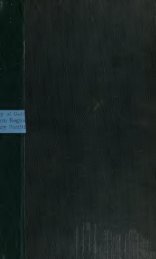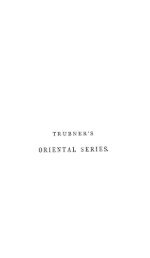Untitled
Untitled
Untitled
You also want an ePaper? Increase the reach of your titles
YUMPU automatically turns print PDFs into web optimized ePapers that Google loves.
16' ,<br />
GHAHAR ( MAQALA. ANTHROPOLOGY<br />
telligencc he became king 'over ali animals, and brought all<br />
things under his control." Thus from the mineral world he made<br />
t<br />
jewels, gold and silver his adornment ; from iron, zinc, c'opper,<br />
lead 'and tin he fashioned his utensils* and vessels; from the<br />
vegetable k'ingdom he macjie his food, raiment and bedding ;<br />
and<br />
Jrom the animal world he obtained for himself steeds and beasts<br />
of burden. An6 from all' three king'doms he chose out medica-<br />
ments wherewith to heal himself. Whereby did there accrue to<br />
him such pre-eminence? By this, that he understood abstract<br />
ideas, and, by means oj these, recognized God. And whereby<br />
did he know God ? By knowing himself; for "He who knoweth<br />
himself, knoweth his Lord" ( .<br />
So this kingdom [of man] became divided -into three classes.<br />
The first is that which is proximate to t'ne Animal Kingdom,<br />
such as the wild men of the waste and the mountain, whose<br />
aspiration doth not more than suffice to secure their own livelihood<br />
by seeking what is to their advantage and warding off<br />
what is to their detriment. The second class compriseth the<br />
inhabitants of towns and cities, who possess civilisation, power<br />
of co-operation, (\ ) and aptitude to discover crafts and arts ;<br />
but whose scientific attainments are limited to' the organisation<br />
of such association as subsists between them, in order that the<br />
1<br />
classes<br />
different may continue to exist. The third class compfiseth<br />
such as are independent of these things, and whose<br />
occupation, by night and by day, in secret and in public, is to<br />
reflect, "Who are we, for what reason did we come into existence,<br />
and Who hath brought us into being?" In other words," they<br />
hold debate concerning the real essences of things, reflect on<br />
their coming, and anxiously consider their departure, saying,<br />
" How 'nave we come ? Whither shall we go ? "<br />
This class, again, is subdivided into two sorts ; first, those<br />
who reach th^ essence of this object by the help of ^masters and<br />
and such<br />
by laborious toil, voracious study, reading and writing ;<br />
are called "<br />
Philosophers." But there is yet Another sort who,<br />
without master or book, reach the extreme limit, of this problem,<br />
and these are called " Prophets."<br />
Now the peculiar virtues of the Prophet are three: first,<br />
(<br />
2<br />
that, without instruction, he khows all knowledges<br />
; secondly,<br />
that he gives information concerning yesterday and to-morrow<br />
otherwise than by analogical reasoning and ; thirdly, that he<br />
hath such psychical power that from whatever body he will he,<br />
taketh the form and produceth another form, which thing pone<br />
can do save such as are conformed to the Angelic W6rld. Therefore<br />
in the Human World none is above him, and his c<br />
command<br />
(<br />
1 Or perhaps "races." The word is ft'^'j plural of ^J, "speVles." ,<br />
2 This is what is called 'Ilm-i-Ladunni, or knowledge directly derived from God.<br />
t<br />
'








![La religione di Zarathustra nella storia religiosa dell' Iran [microform]..](https://img.yumpu.com/15970820/1/151x260/la-religione-di-zarathustra-nella-storia-religiosa-dell-iran-microform.jpg?quality=85)


